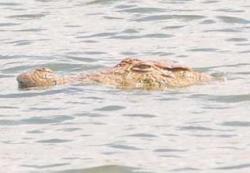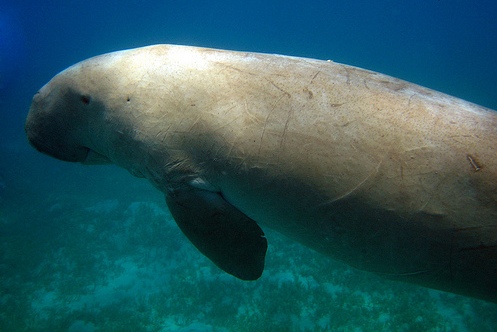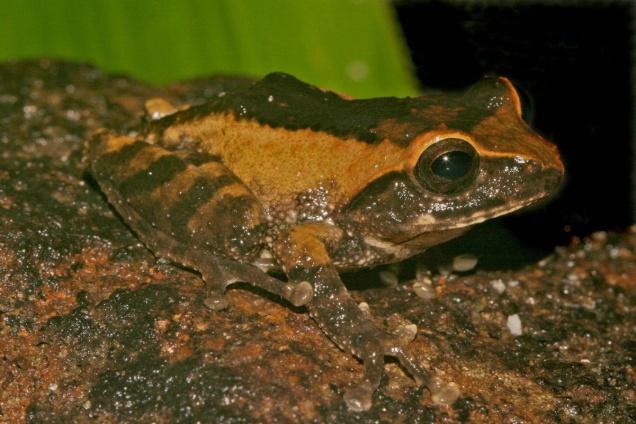Vishakhapatnam a coastal town in Andhra Pradesh was once known for the abundant nesting grounds of Olive Ridley Turtles along its sea coast. But now the town is gradually losing ground due to increased development, poaching and pollution along the coast line. To save the endangered sea turtles and prevent them from extinction, an organisation Visakha Society for Protection and Care of Animals (VSPCA) has taken an active role by its rangers, constantly patrolling the beaches, monitoring nesting sites, eggs and their hatchings. By taking a step further the organisation is involving local villagers, fishermen, in the endeavour by employing and educating them to the cause.
Freshwater Crocodiles back from the brink of Extinction in Manjira River
Manjira river is a tributary of Godavari river that flows in three states of India namely – Karnataka, Andhra Pradesh and Maharashtra. Of late the Manjira River running about 60 km from Hyderabad has seen a surge in freshwater crocodile population nearing 300 in number. This is a direct outcome of the efforts put in by the forest officicers to save the species from becoming extinct as the number had alarmingly fallen to less than 4 pairs in 1974.
Dugongs: The Gentle Sea Cows
The name Dugong probably may not ring a bell to most. Otherwise known as Sea-cow, Dugongs are marine mammals akin to sharks, whales, seals and dolphins. These are harmless underwater animals, big in size and feed only on sea grass, coming on to the surface of water at regular intervals to breathe like whales and Gangetic Dolphins. They spend most of their time feeding on sea grass; because of this, their habitat is restricted to coastal waters of Indo-west –Pacific tropics and ranges across 37 nations. Once found in abundance, today their species are in extreme danger due to uncontrolled mechanized fishing, poaching and habitat loss. Dugongs are categorised as threatened species coming under the IUCN Red list. Quite a few important conservation measures are being undertaken by organisations including Government of India.
Specialised Counter Poaching Training for Asia’s Forest Rangers
In an altogether different kind of offensive, an intense counter poaching operations training is being undertaken by around 50 park rangers of Asia including India in an effort to save and provide security to Asia’s forest reserves. Named ARREST (Asia’s Regional Response to Endangered Species Trafficking), the program is aimed at equipping forest rangers with improved patrolling techniques and law enforcement. The two week long training course, is being funded by the US Government.
Ten New Frog Species Discovered in Western Ghats
Discovery of new frog species at the Western Ghats of India has further strengthened the claim that these Ghats are the heart of biodiversity. While frog species round the world are driven to extinction due to habitat destruction, pollution, climate change and of late, much sought frog legs, the discovery of new frog species is refreshing news. The expedition in the Ghats was carried out by biodiversity researches, voluntary researches and nature enthusiasts without any funding from agencies and they succeeded in discovering ten new frog species.
Increased Frog Leg demand Threatening Amphibians to Extinction
Man’s increased preference for frog legs to satisfy his palate has been posing a great threat to the survival of amphibians round the world driving them to near extinction. The first ever comprehensive study on frog leg market reveals how their reduced numbers and extinction can have devastating effect on the environment and the natural ecosystems; the situation warrants immediate action by way of stopping use of frog species for international trade.
Indian Scientists plan to create a Virtual Fence to Save Forest Animals
Finally Wildlife of India is getting some high-tech attention. A team of scientists have planned to use surveillance technology and Information Technology for creating a ‘Virtual Fence’ to prevent wild animals from straying into human habitation. The proposal has a holistic approach intended to monitor poaching and illegal activities. It is also aimed to protect both man and wild animals
Oxford Researchers to Map Religious Forests across the World Including India
A complete mapping of Religious forests in the world, India included, is being undertaken by Oxford researchers with an objective of identifying religious forests that are rich in biodiversity and having highest number of endangered species. The study envisages assessing these religious forests round the world, enabling scientists to work with religious and community groups […]
Leopard Rescued from a Pipe line in Gujarat
While news of the tragic attack of a leopard on villagers in India’s eastern parts and subsequent killing of the animal filled newspapers all of last week in more refreshing news a wild Leopard stuck in a pipeline near a school in Gujarat was rescued by forest officials.
Gujarat plans to Create First Gene Bank for Wildlife in India
A Gene Bank for wild animals akin to humans is being proposed by the Government of Gujarat backed by the environment ministry, with a view to protecting Lions from inbreeding and eventual extinction. This project, a first for India is estimated to cost Rs. 67 crores.
India’s Claim of Increased Forest Cover may be False feel Researchers
Researchers have repudiated Government claims that India’s forest cover has increased by up to 5% in a span of 10 years. The research conducted by two Indian and an Australian scientist reports that in reality there is decline in natural forest cover by 1.5% to 2.7% each year.











